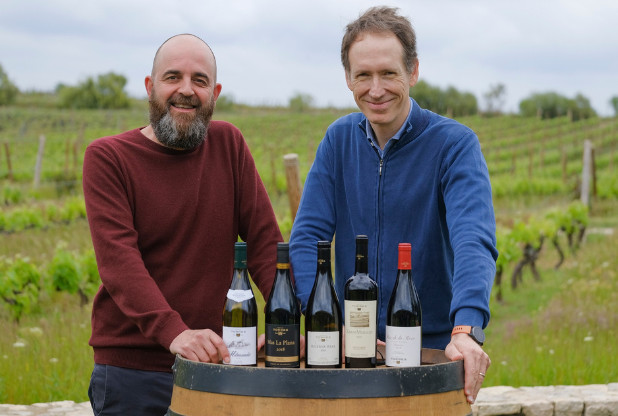
Familia Torres unveils its latest Antologia collection
Familia Torres unveiled the latest vintages of its top single-vineyard wines in an exclusive tasting event held at Trivet restaurant in London this week.
A wine dynasty admired as much for its commitment to sustainable practices as it is for the quality of its wine, the new Antologia collection is intended to reflect the very best of the Torres portfolio and what the company represents.
Chief winemaker of Torres, Josep Sabarich (left), said: “Our role as winemakers when making these wines is to let the vineyard express itself freely, revealing the vintage variations and finding the right balance to enhance the natural freshness and varietal character with very little intervention.”
All five wines are born from organic and regenerative vineyards across the Torres estate, which includes the use of a balloon capture system that traps and reuses 20 tonnes of carbon dioxide a year during the fermentation process. Over the past decade, the Torres family has spent €16m on environmental practices, with no signs of slowing down.
The theme of low intervention was prevalent across the entire range, especially with the Milmanda 2020, Torres’ 100% Chardonnay from the Conca de Barberà vineyard. For the first time, in 2020, the wine underwent no malolactic fermentation and the oak was partially withdrawn, comprising just 50% new French oak compared to 80-90% in previous years. According to Sabarich, the reduction in oak is an emerging trend across Spain with the exception of Rioja, where the rules dictate otherwise.
“The acidity was lower than in the past,” said Sabarich, which necessitated the ‘zero-malo’ approach, although he added this was a choice because of “climate and style”.
“We have gradually reduced the use of malolactic over the years but 2020 is the first with 0%,” continued Sabarich.
It was for this reason that Sabarich considered the use of concrete eggs unsuitable for a ‘low-acidity’ wine like Milmanda – a method becoming increasingly prevalent in the making of white wines more generally.
Mas La Plana 2019 – a wine of global renown since winning the 1979 Wine Olympics in Paris, is made using wood fermenters. A product of a dry year, with less than average rainfall, the Cabernet Sauvignon grapes were hand harvested from the Mas La Plana vineyard.
“We have two different Cabernet Sauvignons, with different techniques which is important because it introduces diversity into the blend. That’s one of the problems with monovarietal wines, they can lack this diversity,” said Sabarich.
The Reserva Real, by contrast, is more conventional in its winemaking process, although the 2019 iteration required a larger percentage of Cabernet Franc (35%, as opposed to 10-15% in a normal year) because it is better suited to dry conditions.
The wine originates from a 4-ha vineyard in the heart of Penedès, and, as such, has a very limited production.
The Grans Muralles 2019 is the embodiment of another well-regarded Torres initiative – the reintegration of ancestral grape varieties. Recovered by Torres 40 years ago, this wine was first crafted in 1996 and included the ancestral Garró grape. From the 2009 vintage, it added another ancestral variety named Querol, to make up the final blend with Cariñena, Garnacha and Monastrell.
Of the 2019 vintage Sabarich said: “Garnacha plays more in the nose with floral aromas, fruit aromas and is the soul of the wine. Cariñena is more for the structure, the backbone of the wine. The other three increase diversity, bringing more aromas and complexity to the wine.”
Despite accounting for 10% of the wine, Querol is a grape that cannot be used as a single variety due to its low acidity.
The final wine in the range is one that doesn’t need a winemaker, joked Sabarich. Mas de la Rosa is the most exclusive wine in the Familia Torres portfolio, hailing from a 1.86ha vineyard where only hand farming is possible.
It is an ancient vineyard of slate soils (called Llicorella in Catalan), planted over 80 years ago on steep hillsides, and one of the first historical wine estates in Porrera. Its location, elevation and orientation allow for the ideal amount of exposure to the sun.
The price reflects the wine’s scarcity and is predominantly sold to private clients and high-end restaurants with little to no presence on the secondary market due to its infancy (this is only the fifth vintage of Mas de la Rosa).
Familia Torres Antología latest vintage releases (UK pricing, available from Fells):
Milmanda 2020, DO Conca de Barberà, 13.5% (£45)
Mas La Plana 2019, DO Penedès, 14.5% (£60)
Reserva Real 2019, DO Penedès, 14.5% (£120)
Grans Muralles 2019, DO Conca de Barberà, 14.5% (£110)
Mas de la Rosa 2020, DOQ Priorat, 14% (£300)




